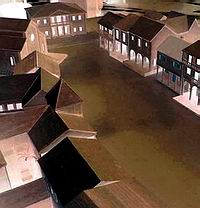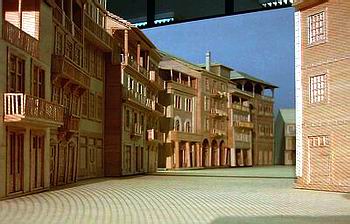Education Conference
Postcard View of Viseu, Portugal
Teaching of Architecture and Urbanism
in the Age of Globalization
5th May - 9th May 2004
Lisbon - Viseu - Tomar
Portugal
New School of Architecture
(Universidade Catolica Portuguesa)
The Education Conference in Viseu addresses the necessary reform of the teaching of architecture & urbanism, --in, and, --beyond Academy, and proposes to craft new approaches, or strategies of architectural & urbanistical education for students, professionals and laymen.
The Conference is particularly interested, -- to explore didactics with a more efficient integration of all architectural scales, from landscape, city, to building detail and ornament,-- to enhance the integrated architecture & urbanism curriculum, --to update scientific evidence and knowledge and its potential for new operative methods in architecture and urbanism, --to create better interdisciplinary tactics and community related studio activities, --to redefine the studio in its relationship to challenges of practice, history and theory, etc..
The Conference will explore teaching methods and educational models which can both enhance local and regional specificities and potentials, and benefit from the most updated knowledge of science, crafts and arts, regarding man and nature and the universe.They also encompass strategies in education which address practically and philosophically the objectives and means to inhabit our world wisely, respectfully, and beautifully, as responsible global village, and local neighbourhood citizens, by building according to principles enhancing and supporting life, in harmony with the local and the universal, and acknowledging the positive potentials of Globalization to oppose its destructive ones.
Urban Typology&Morphology Model Study, Viseu (2004)
Contemporary education has not only lost its influence in practice, and in the crafting of an inhabitable and sustainable world, but it has also lost its capacity and desire to cultivate, to inspire and to teach.. --And very sadly it has just given up on the very principles of education and training, lost its efficiency to educate, traded its credibility in its rapports with professionals and laymen, and lost interest in the relevance of architecture and urbanism as essential manifestations of human cultures!
The context of Globalization suggests a destructive, monolithical banalization of the whole world, with a singularly impoverished cultural pattern of Western ascendance,-- ignoring the differences of historic cultures and the flavours of local traditions, as much as the variances of climate, topography and geology...
The geo-political and economic phenomena of Globalization is paralelled by an impressive propaganda machinery, discussing and promoting the international deconstruction of a colorful and diverse building culture into a large, stereotyped, global "junk space".. Academy has found much excitement in participating to this cultural and educational deconstruction: --rather than teaching efficient strategies to operate locally and regionally in sustainable practices, Academy subscribed eagerly to futile paradigms of gobalizing aesthetics, arbitrary doctrines and pseudo-scientific ideologies and stereotypes.. Academy lends its historical prestige to perverting infinite amounts of creative intelligence.. Whole generations of students are consumed in meaningless creativity statistics. Abundant and redundant imagery of a global consumerist suburbia appear as symptoms of helplessness regarding the challenges of architecture and urbanism in the contemporary world.
However Globalization offers other potentials of civilized action, of rapid communication and of positive interaction at a planetary level, without necessary compromising of the integrity of local cultures and environments... The possibility of collaborations and synergies in complex global scenarios, and the instrumental complexity of -- globalized new technologies, and, -- globalized softwares, should be considered very seriously. They can paradoxically be antidotes to the disruptive consequences of Globalization, and offer to play a major role in new educational strategies based on: international exchange, virtual teaching and distant learning, interdisciplinary tactics, continuous education, popular universities, interactive charrettes and community workshops, self-teaching and tactical learning, etc.
Urban Typologies, Model by First Year Students (2003)



